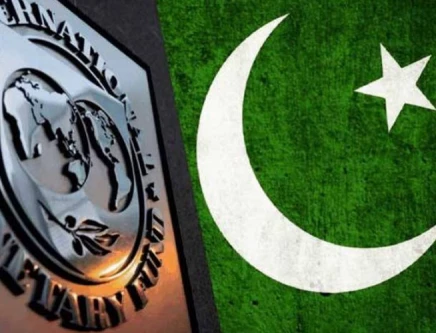Pakistan requests $1b in IMF climate cash

Pakistan is targeting around $1 billion in a formal request for funding from the IMF facility that helps low and middle-income countries mitigate climate risk, Finance Minister Muhammad Aurang told Reuters.
“We have formally requested to be considered for this facility,” the minister said in an interview on the sidelines of the IMF/World Bank autumn meetings in Washington.
The International Monetary Fund had already agreed to a $7 billion bailout for Pakistan but has further funding available via its Resilience and Sustainability Trust (RST). The RST, created in 2022, provides long-term concessional cash for climate-related spending, such as adaptation and transitioning to cleaner energy.
“We think we are a very good candidate to be considered for a facility like this,” Aurangzeb said, adding that they aim to conclude the request in the coming months.
Aurangzeb said they were talking to “a few other institutions” in addition to the AIIB for a credit enhancement. Credit enhancements provide some level of guarantee for bonds, which can boost their rating, attract more investors, and thus cut the government’s borrowing costs.
Issuing in the world’s “second largest and the second deepest” capital market was, Aurangzeb said, the key aim, rather than a particular issuance size. “From our perspective, it is diversification of the funding base. Even if the inaugural issue is not significant in size, for us it is important that we print that, and of course then we can keep it on tap.”
Aurangzeb said Pakistan has engaged with Middle Eastern banks regarding commercial loans, and one had submitted “a relatively significant proposal”.
Privatization
The minister hoped to finalize both the delayed privatization of the flag carrier and the outsourcing of Islamabad’s international airport in November.
During a previous interview with AFP in April, Aurangzeb had said he hoped the privatization of the government-owned Pakistan International Airlines (PIA) could be completed by June 2024.
Speaking Wednesday, the finance minister said the five-month delay was down to two factors: ensuring macroeconomic stability, and doing the proper due diligence of the interested parties.
“The reality is, when any foreign investor comes in, or even the local investor, who are going to put in a substantial amount of money, they want to ensure that the foundation is there,” he said, referring to macroeconomic factors.
Aurangzeb noted that potential bidders for both PIA and Islamabad airport also required scrutiny, another factor in the delay.
“Therefore, it’s ultimately the cabinet which approved the extension in the timelines so people can do their due diligence before they make these submissions,” he said.
Aurangzeb said Pakistan had been behind on existing profit and dividend repayments when the current government took office and had taken steps to remedy that after making progress on macroeconomic stability.





